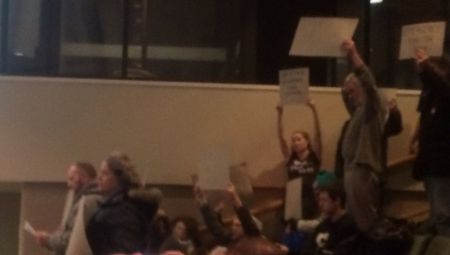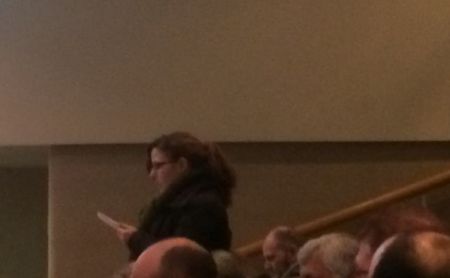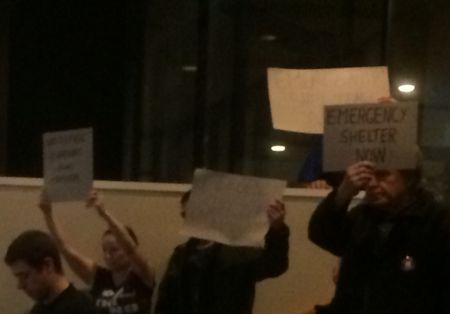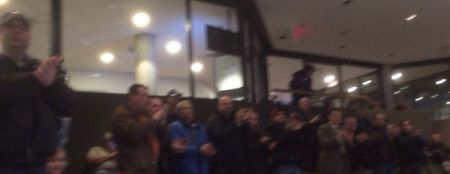Members and supporters of the Sudbury Coalition Against Poverty (S-CAP) interrupted tonight's city council meeting with a statement, signs, and chanting to demand council end its inaction on emergency night-time shelter for homeless people.
Shortly after Mayor Marianne Matichuk called the meeting to order, S-CAP organizer Anna Harbulik stood and declared, "We need an emergency overnight shelter now, where anyone and everyone is accepted and able to find space." She continued, "It needs to be open throughout the winter, not just when the temperature drops below -15 degrees ... and it needs to be a space where people are allowed to sleep."
As Harublik read more of the statement, some of the 20 anti-poverty activists in attendance took out signs, while others set out sleeping bags and blankets on the steps of the council chambers.
At their deputation last week to the city's Community Services Committee, S-CAP described their concern with the many barriers that exclude people from the city's 69 formal shelter beds, and with the fact that the city's only night-time drop-in is not open every night in the winter and does not permit people to sleep.
One of their core requests at that meeting was that Sudbury build on the example set by the City of Toronto, which responded to demands from the Ontario Coalition Against Poverty and began using space in its city hall as a warming centre. Though a number of questions flowing from the delegation were referred to staff for investigation, ways to make use of existing city-owned space for emergency night-time warming during the winter months was not one of them. Nor was there any mention in the agenda for tonight's city council meeting of items to be considered related to homelessness.
Mayor Matichuk initially attempted to ignore the activists and proceed with the meeting. As the activists persisted and transitioned into delivering the statement in French, she attempted to call a recess and encouraged council members to leave the room: "Council may want to retire to the council chambers. We're going to be taking a recess for a few minutes."
Most the other 50 or 60 residents present at the meeting seemed to be there as members and supporters of the United Steel Workers and other local unions, for a presentation scheduled for later in the meeting on workplace safety issues. Loud mutterings of "shame" from that part of the crowd met the mayor's suggestion that council leave, and most members of council decided to stay in the room.
When both the English and French versions of the S-CAP statement had been read, there was a standing ovation and lengthy applause from members of the union delegation.
Though security guards intervened to get the anti-poverty activists to put down their signs and to leave the council chamber, S-CAP members largely ignored them and security did not insist.
S-CAP member Phil Marsh concluded a subsequent English-language statement with the message, "This is a decision that needs to be made tonight!" The group then left to the chant, "What do we want? Emergency shelter! When do we want it? Now!" while another of the activists called out, "Does someone have to die before you make a decision?"
After the anti-poverty activists left, the mayor proceeded immediately to the first item on the printed agenda, with no reference to the issues raised by the activists.
In discussion after the action, Harbulik said, "In response to this at the Community Service Committee meeting, the city said that they would look into it and potentially have a plan in six months to a year. So what about the people who are sleeping on the streets right now, this winter? This is an immediate problem, an urgent problem ... and we're hoping they heard our message that a decision needs to be made tonight." She emphasized that S-CAP is not posing shelters as the answer to homelessness, but as a necessary emergency measure that must be part of larger efforts to address poverty, like raising social assistance rates and the minimum wage.
S-CAP member Clarissa Lassaline said that the accidental presence of the large and supportive union delegation was likely important to S-CAP being able to complete their action without either more council members leaving or security intervening in a more forceful way, and she hoped their vocal support would help sway the council to action. "That is the solidarity that we need," she said.
Scott Neigh is a writer, activist, and media producer based in Sudbury, Ontario. He is the author of two books of Canadian history told through the stories of activists, and is the producer/host of Talking Radical Radio.




